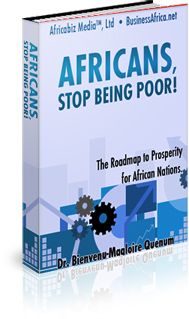|
****JavaScript based drop down DHTML menu generated by NavStudio. (OpenCube Inc. - http://www.opencube.com)****



Click
here for
Million ads and auctions
|
| ! |
| AFRICABIZ
VOL 2 - ISSUE: 120
October 15, 2010 - January 14, 2011
Previous
Issue
Editor: Dr. Bienvenu-Magloire Quenum
Click here for contact & support console
| | A
WORD FROM THE EDITOR
| | |
|
Dear visitor and international investor,
We
warmly welcome you, if this is
your first visit to Africabiz
Online - The ultimate newsletter
on trading and investing in 49
sub-Saharan African countries.
If you are a regular and faithful
reader, welcome back.
-
HUNGARY REBUFFS IMF ON BUDGET DEFICIT - ANOTHER EXAMPLE FOR AFRICAN NATIONS TO EMULATE
Previous issues [1, 2, 3] dealt with the collapse of the economy of the Republic of Iceland - consecutively to the world financial crisis that (officially) erupted end of 2008.
Link (3) above outlined, compared the plight of African nations submitted to Structural Adjustment Program (SAP) to Iceland's one. Icelanders, put on the same SAP regime by the IMF, rejected the injunction made by the European Union to pay back debts linked to the collapse of IceSave bank. They made history, and opened the door for other nations to follow suit.
Another European country, Hungary, just did the same, refusing to surrender to the IMF and the European Union fiscal policy of belt-tightening, as a prelude to obtaining financial support.
Indeed, beginning of July 2010, the Hungarian government of Prime Minister Viktor Orban rebuffed requests from the IMF and the European Union to impose more austerity measures in exchange for the next installment of a �20 billion (US$26.5 billion) loan package established in October 2008, at the height of the global financial crisis.
The IFM and the European Union's injunction, was based on the fact that Hungary is running a budget deficit of 3.8%.
Interesting. Very interesting. The rebellion of the Hungarians, is legitimate because their deficit level of 3.8%, is not the highest in the European Union. France, for instance, is currently running a deficit in the range of 6%, to be narrowed, according to French authorities, to 3% around year 2012. For the United States of America the deficit borders 12% of the GDP.
And oddly enough, these countries have yet not been singled out by the IMF. You speak of double standards? Oh yeah! That was the norm for Africa. Now, several European countries are joining the same boat as African nations. And it is a good thing that they are resisting pressure, to abide to stringent austerity measures in order to get financial assistance.
"The austerity policy of the last 4-5 years, introduced at the cost of growth and competitiveness cannot be continued," declared Hungary's Economy Minister Gyorgy Matolcsy, according to Budapest Business Journal. And
The Hungarian Social Forum applauds the government position, according to the same, Budapest Business Journal:
"The government proved to be responsible towards Hungarian citizens living from their work by not giving in to the European Union's demands on introducing further austerity measures in exchange for receiving the remaining part of the stand-by loan. [...] International creditors should acknowledge that Hungary�s stability is not only a budgetary issue but also a social one, which also affects the international financial systems and the stability of Europe as well."
That statement stands also for African nations. Don't you think so? Without social stability, there is no development. Right? That makes sense. But not for the pundits from the IMF, and other financial institutions. They only think about budgetary issues.
The IMF and the European Union's position, to claiming for more austerity measures from the Hungarian government, is more absurd, when Olli Rehn, Commissioner for Economic and Monetary Affairs did recognized that "Hungary has returned to a positive economic growth path and now has one of the lowest budget deficits in the EU."
Anyway, Hungary does not intend to borrow from the International Monetary Fund (IMF) again, declared on September 3, 2010 Hungarian Economy Minister Gyorgy Matolcsi, at a meeting of business leaders in the capital on September 3, 2010.
And Prime Minister Viktor Orban subsequently spoke of Hungary seeking to regain its "financial autonomy" and said his government would not have its economic policy dictated from abroad.
Above statements made by politicians and Social Forum fighters, are interesting because African countries economic policy is currently, and since three decades running, dictated from abroad, by the pundits of the IMF, the World Bank, who advocate for privatization, salaries cuts, and debts repayment prior to Education and Health development.
All this belt-tightening being done
in spite of the fact that African nations are managing to produce positive growth rates - around five percent a year, for a decade ruining.
Based on above the lesson to be drawn from the Hungarian crisis, reads as follows:
"Should countries take care of deficits on the detriment of the people; or should they implement financial, monetary and budget's strategy that assist creating jobs, and riches for all?" That is the question.
Play the video that shows below, and in addition spare some time to listen to Jeremy Lee explaining the monetary system, and the absolute imperative that nations (or states) establish their own banks and/or currencies. Take your time and listen to the six parts of Jeremy Lee's expos�, and see for yourself how our African nations can do better, turning around the economy to joining the developed world. Listen at least to parts 4, and 5. Replace Australia by Africa and have a good day!
Click here to read about The Collapse of a Predatory Economic System: Part IV: Greed, and the Domination of the Many by the Few are the Main Causes of the Financial Crisis
- SERVICES
AND PRODUCTS FROM Dr. QUENUM & ASSOCIATES / BUSINESSAFRICA (TM)
List of Products and Solutions to trading and
investing in and out emerging nations - and particularly in sub-Saharan
African nations - is
here to review.
We draw your attention to the Jobs & Projects'
platform that assists first, project-owners to tender for
the best experts to carry out projects at very competitive costs,
and, second, job-seekers to publish for free Résumés/CV
to attract project-owners attention.
The Free and Pay-Per-Click advertisement
platform is also the cheapest way to advertise for your business
and drive traffic to your website.
-
Contributor's Guidelines
are here to review. Your
contribution on "How
emerging nations and particularly
African countries / entrepreneurs
could bridge the developing gap" is
welcome.
| Your
feedback / objection / contribution is welcome. Visit WorldWide
BizCenter,
and choose General
Information (as topic) to
create a thread for discussion. On the top of the WorldWide BizCenter page,
there is a HELP link to assist you making an efficient
use of the discussion board. This
link also is useful | Many
thanks for dropping by and see you here on January 15, 2011
Dr.
B.M. Quenum
Editor
of AFRICABIZ

|
| |
| BUSINESS
OPPORTUNITIES IN AFRICA
|
 -
Several business opportunities - component parts of the Integrated Developing Scheme described in Africans, Stop Being Poor! are listed in following table. -
Several business opportunities - component parts of the Integrated Developing Scheme described in Africans, Stop Being Poor! are listed in following table.
|
1-SHEA BUTTER (5,
6, 7,
11, 12,
13)
2- BLUE GOLD (14,
15, 16,
17, 18,
19)
3- FREEZE-DRIED PAPAIN (20,
21, 22
and here)
4- KENAF (23,
24)
5- VEGETABLE OIL (25,
26, 27,
28)
6- CEREALS (30,
31, 32,
33)
7- FRUITS (34,
35, 36,
37, 38,
39, 40,
42, 43,
44, 45,
46)
8- ESSENTIAL OILS (47,
48, 49,
50, 51,
52)
9- ROOTS & TUBERS (54, 55, 56, 57, 58, 59, 60, 61, 62, 63, 64) |
10- FOWL BREEDING (66, 67, 68, 69, 70, 71, 72, 73, 74, 75, 76)
11- FISH FARMING (78, 79, 80, 81, 82, 83, 84, 85, 86, 87)
12- BIOMASS ENERGY (89, 90, 91, 92)
13- SUGAR
CANE & PRODUCTS (93, 94, 95, 96, 97, 98,
99/100, 101, 102)
14- LIVESTOCK (103,
104,
105,
106,
107,
108,
109, 110,
111,
112
15- MISCELLANEOUS (113, 114, 115, 116, 117, 118, 119, 120, 121 |
|
 -
MISCELLANEOUS SERIES:RENEWABLE ENERGY: PART VIII: A SMALL SCALE OPERATION TO PRODUCING ETHANOL -
MISCELLANEOUS SERIES:RENEWABLE ENERGY: PART VIII: A SMALL SCALE OPERATION TO PRODUCING ETHANOL
A report available at this link outlines the contribution of the ethanol industry to the United States's economy.
Please do read through that remarkable report that shows why any developing country should develop a bio-ethanol industry to cater for its national market's industrial needs - and boost its global economy, creating jobs and increasing riches for all.
Doubtless, based on facts and figures exposed in the report, one can say that ethanol, as a component part of the developing strategy here exposed is a true economic catalyst
Indeed, ethanol has widespread use as solvent of substances intended for human contact or consumption, including scents, flavorings, colorings, and medicines. In chemistry, it is both an essential solvent and a feedstock for the synthesis of other products. It has a long history as a fuel for heat and light, and more recently as a fuel for internal combustion engines.
Unfortunately as shown on the table available here, most of developing countries, and African nations in particular, are quite non-existent on the global worldwide ethanol production market apart from Southern African countries, South Africa - and Malawi.
The current delivery deals with Ethanol's production on a small-scale basis - using state of the art movable equipment.
 -
SUITABLE EQUIPMENT -
SUITABLE EQUIPMENT
 There is no need anymore to establish energy guzzling big facilities - investing in the range of several million US$, to produce ethanol. There is no need anymore to establish energy guzzling big facilities - investing in the range of several million US$, to produce ethanol.
This can now be done making use of small-scale equipment/ manually operated or computerized.
The equipment at the left side side of this paragraph is from Revenoor.com, to produce 32 Gal. (121 liters) per day of ethanol - an example of a home model ethanol production facility.
 At the following link/ site you have state-of-the-art movable manually operated or computerized equipment to produce ethanol from various At the following link/ site you have state-of-the-art movable manually operated or computerized equipment to produce ethanol from various biomass feedstock. The production range, in accordance with appropriate equipment spans from 100 Gal. to 2,000 Gal. per day. One of the model/ equipment, pictured at the left side of this paragraph can produce 200 Gal. of ethanol per day biomass feedstock. The production range, in accordance with appropriate equipment spans from 100 Gal. to 2,000 Gal. per day. One of the model/ equipment, pictured at the left side of this paragraph can produce 200 Gal. of ethanol per day
And the equipment pictured at the right side, is the MicroFueler. Aimed at both home users and businesses, the MicroFueler distills discarded waste containing sugar, brewing residues from soft drink and beer brewing factories, sugar water obtained from organic waste, cellulosic materials, algae, and carbohydrate-rich plants into ready-to-use E-Fuel100 ethanol, which it can pump right into your car. Production level is up to 280 Gal (1,058 liters) every 7 days. You could also use the E-fuel100 to run a power generator called GridBuster™, designed by the MicroFueler's maker - to provide household electricity. Everything is explained in the following video.
Unlike other ethanol production processes, the MicroFueler does not involve combustion, so is reportedly safe. While it can directly process sugar-rich liquids such as waste alcohol, it needs help breaking down cellulosic materials such as vegetable matter and wood... hence the need for prior processing by the MicroFusion Reactor.
 -
ECONOMICS OF A SMALL SCALE PRODUCTION FACILITY -
ECONOMICS OF A SMALL SCALE PRODUCTION FACILITY
The Table below exposes ethanol's yield from various carbohydrate plants. It shows that cereals are the most promising feedstock to producing ethanol. However, in developing countries, it would be an aberration to transform cereals to ethanol when food security is a major concern.
| Ethanol Yield From Carbohydrate-rich Plants - Source |
| Raw Materials |
Carbohydrate |
Ethanol |
| |
ton/ha |
% |
liters/ton |
hl/ha |
| Beet |
40-50 |
16 |
90-100 |
38-48 |
| Sugar Cane |
50-100 |
13 |
60-80 |
35-70 |
| Maize |
4-8 |
60 |
360-400 |
15-30 |
| Wheat |
25 |
62 |
370-420 |
8-20 |
| Barley |
2-4 |
52 |
310-350 |
7-13 |
| Grain Sorghum |
2-5 |
70 |
330-370 |
7-18 |
| Potatoes |
20-30 |
18 |
100-120 |
22-33 |
| Sweet potatoes |
10-20 |
26 |
140-170 |
16-31 |
| Cassava |
12-15 |
27 |
175-190 |
22-23 |
Several Africabiz Online's deliveries dealt with different types of biomass/ raw materials to producing ethanol - such as cassava (54, 55, 56, 57, 58, 59, 60, 61, 62, 63, 64), molasses, sugar cane (93, 94, 95, 96, 97, 98, 99/100, 101, 102), corn and maize (30, 31, 32, 33)
Let us consider cassava roots as feedstock to a MicroFueler equipment. The last line of above table reveals that one ton of cassava could yield at least 175 liters of ethanol. One can then assume that the weekly ethanol production (1,058 liters) of a MicroFueler facility would necessitate 6 tons of fresh crushed cassava. Taking these assumptions and considering the acquiring price of a MicroFueler unity and a GridBuster™ unity (imported to an African country - customs duties included) to be around US$30,000, the economics reads as follows
Total
investment |
US$35,000 |
|
YEARLY PRODUCTION
LEVEL
|
| 1-
E-Fuel100 = 53,958 liters over 51 weeks. |
|
OPERATING
COSTS
|
Operational
Expenses: Raw material - around 310 metric tons of fresh cassava, transport to plant
floor - staff and hands / management salaries. Etc. |
US$12,000 |
| Cost
of production off Plant Floor of One Liter
of E-Fuel100 |
22.23 Cents |
This is an astounding result that shows the potential to using the MicroFueler to produce Ethanol in African countries. Indeed, in these gasoline price currently stands above one dollar per liter, and may in some reach as much as three dollars per liter.
Furthermore, cooking energy is based on wood-fire in African rural areas - and the usage of gas-canisters in cites - when available. The usage of wood for cooking energy is of course the cause for the destruction of rare forest. Therefore, it is obvious that a network of ethanol producers would assist solving the energy problem in most African country.
| MORE ON ETHANOL |
1- Alcohol Fuel:
A Guide to Making and Using Ethanol as a Renewable Fuel (Books for Wiser Living from Mother Earth News)
by Richard Freudenberger (Paperback - Nov. 1, 2009)
2- Sustainable Ethanol:
Biofuels, Biorefineries, Cellulosic Biomass, Flex-fuel Vehicles, and Sustainable Farming for Energy Independence
by Jeffrey Goettemoeller and Adrian Goettemoeller (Paperback - Sept. 25, 2007)
3- Process Synthesis for Fuel Ethanol Production
(Biotechnology and Bioprocessing)
by C. A. Cardona, O.J. Sanchez, and L.F. Gutierrez (Hardcover - Dec. 3, 2009)
4- Thermophilic Microbes in Ethanol Production
by Graham G. Stewart and Inge Russell (Hardcover - Mar. 31, 1987)
5- A Guide to Commercial-Scale Ethanol Production and Financing
by Solar Energy Research Institute (Paperback - Aug. 2002)
6- Fuel From Farms:
A Guide to Small-Scale Ethanol Production
by National Agricultural Library (Hardcover - Jan. 1, 1982)
|
7- Ethanol and Biofuels:
Production, Standards and Potential (Renewable Energy: Research, Development and Policies)
by Wesley P. Leland (Paperback - Apr. 2009)
8- Energy and Carbon Balances of Biofuels Production:
Biodiesel and Ethanol (Proceedings of the International Fertiliser Society)
by R. E. Horne, N.D. Mortimer, and M.A. Elsayed (Paperback - Apr. 30, 2003)
9- Fermented Beverage Production, Second Edition
by Andrew G. H. Lea and John R. Piggott (Paperback - June 2003)
10- Fuel from Farms:
A Guide to Small Scale Ethanol Production
by Solar Energy Research Institute (Paperback - Apr. 13, 2010)
11- Ethanol production From Date Syrup:
Continuous Ethanol Fermentation Using Flocculent Yeast
by Hayder Kh. Q. Ali and Zinah Al-Azzawi (Paperback - May 26, 2010)
12- Handbook on Bioethanol: Production and Utilization (Applied Energy Technology Series)
by Charles Wyman (Hardcover - July 1, 1996) |
Adobe
Acrobat Reader is available here
- Interested parties - private African and international investors /
companies, government
agencies,
international development
agencies - to make contact through the Free Access Support Console available at this link
Contact through the support console will get quickest reply from Africabiz Online's staff, than contact by emails. Click here for contact information. Be advised that first contact should be through the support console to be followed by phone calls. If you are a VIP-Member, use VIP-Members Support Console available here.
Before you consult please click
here to review this clarification
|
| |
|